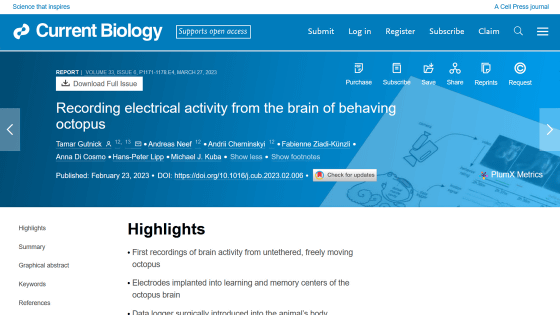Research teams such as Okinawa Institute of Science and Technology Graduate University succeed for the first time in the world in recording brain waves of moving octopuses

Octopuses
Recording electrical activity from the brain of behaving octopus: Current Biology
https://doi.org/10.1016/j.cub.2023.02.006

World's first successful recording of moving octopus brain waves | Okinawa Institute of Science and Technology Graduate University (OIST)
https://www.oist.jp/ja/news-center/news/2023/2/24/scientists-record-first-ever-brain-waves-freely-moving-octopuses
Scientists Have Recorded Brain Waves From Octopuses Just Living Their Lives : ScienceAlert
https://www.sciencealert.com/scientists-have-recorded-brain-waves-from-octopuses-just-living-their-lives
We're one step closer to reading an octopus's mind | Ars Technica
https://arstechnica.com/science/2023/04/in-a-first-researchers-track-brain-activity-in-a-free-moving-octopus/
Octopuses can perform complex cognitive tasks such as using tools, remembering complex operations, observing and learning things, and some researchers even argue that `` octopus farming should be stopped ''. I'm here. Octopuses have eight tentacles with excellent processing power , and there are research results that can sense light only with their feet.
A 2022 study reported that the part of the octopus brain that plays an important role in cognitive function has a base sequence called `` transposon '' that is also present in the human brain.
The secret of octopus intelligence may be in ``the same gene as humans''-GIGAZINE

In order to study the intelligence of octopuses, a research team led by Dr. Tamar Gutnick (currently at the University of Naples ), who belonged to the Physical Biology Unit at OIST at the time of the research, undertook an experiment to record the brain waves of moving octopuses. rice field. 'If you want to understand how the brain works, octopuses are a great animal to study compared to mammals,' Guttnick said. They have advanced cognitive abilities that have developed completely differently from vertebrates.'
However, since the octopus can freely manipulate eight tentacles, even if the electrode for measuring brain waves is attached outside the body, it will be removed immediately if the octopus is awake. In other words, if you want to record the brain waves of a moving octopus, you have to embed electrodes under the skin where the octopus tentacles can not reach.
The research team waterproofed a small, lightweight electrode and data logger developed to track brain activity in birds in flight and modified them into a shape suitable for implantation in an octopus. Three American octopuses , which have cavities in their bodies and are easy to embed data loggers in, were selected, anesthetized, and implanted in the vertical lobe and central superior frontal lobe of the brain. These regions are thought to be important for processes such as visual learning and memory.
After surgery, the octopus recovered 5 minutes after being returned to the aquarium, and the brain waves of the moving octopus were recorded for the next 12 hours. In addition, behavior in the aquarium such as sleeping, eating, and moving was also filmed on video.
The following video is a synchronization of the brain waves of an octopus and the state of being filmed. There are several patterns in the brain waves of octopuses, and it was confirmed that ``octopus-specific brain waves'' that continued long and slowly, which had not been seen before, were also confirmed. EEGs similar in amplitude and shape to those of mammals were also confirmed.
In this study, the recovered octopuses were not given tasks related to memory or visual processing, so EEG could not be linked to specific brain activity. In the future, the research team plans to repeat this experiment with other types of octopus, including common octopus, and to record the brain waves of octopuses given tasks related to memory and learning.
Co-author of the paper, former OIST Dr. Michael Kuba, now at the University of Naples, said: 'This is very important research, but it's only the first step. Octopuses are very smart, but their brains We currently know very little about how octopuses work, and this technology will allow us to peer into the brain activity of octopuses as they engage in specific tasks. is a high-impact achievement,” he said.

Related Posts:







